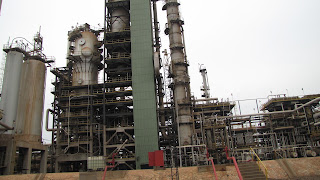 |
| Part of the RFCC Plant |
THE Tema Oil Refinery (TOR) has shut down its two production units, causing sporadic shortage of fuel at certain stations in Accra and its environs.
The Residual Fluid Catalytic Cracking (RFCC) Unit and the Crude Distillation Unit (CDU) were shut down simultaneously on March 11, this year, following crude oil shortage.
A process began a month ago by the management of the refinery to secure letters of credit (LCs) to take delivery of some 650,000 barrels of crude oil it imported into the country through Sahara Oil has hit a snag.
The crude oil, estimated to cost $70 million, if delivered, would have lasted for a maximum of three weeks if the refinery is at its maximum production capacity.
The nature of the LCs implies that the TOR management had to engage more than one bank in negotiations following interest rate variations.
The depreciation of the local currency has affected the financial stability of bulk distributing companies (BDCs) licensed to import finished petroleum products into the country.
The Bulk Oil Storage and Transportation (BOST) Company is also said to have recently diverted its operations into distribution.
An official of one of the BDCs who spoke to the Daily Graphic on condition of anonymity indicated that although the BDCs had imported enough petroleum products into the market, the new position taken by BOST, could equally be blamed for the shortage.
According to him, products imported by the BDCs and handed over to BOST were sent to the latter’s storage depot in Kumasi, while distribution trucks were made to travel long distances there to cart the products back to Accra and other areas for delivery.
“BOST is no longer prioritising its operations that will ensure fair and sustainable distribution in the system,” he lamented.
The persistent shutdown situation is, however, creating a lot of apprehension among the local union of TOR.
An official source close to the leadership of the union told the Daily Graphic that despite numerous assurances from the refinery’s management on crude oil supply, the situation was yet to improve.
According to him, the situation of shortage might become severe if the government failed to make alternative arrangements through the Ghana National Petroleum Corporation (GNPC) for the procurement and supply of finished petroleum products.
“Inactivity at the production units does not only go to overburden the already worse financial situation of TOR but also create unnecessary burden on the refinery’s machinery,” he said.
The union wondered why the government was still hesitant to release the $50 million it promised last year for retooling as part of its immediate strategies to recapitalise the operations of the refinery.
Already, the furnace of the CDU has also developed a mechanical fault resulting from a blockage in its tubes.
That has prevented oil flow through the furnace into the distillation column (where the separation of crude into various products takes place), thereby compounding the refinery’s challenge to function effectively.
The Public Affairs Manager of TOR, Ms Aba Lokko, confirmed a shutdown of the plants but declined further comment.
The Energy Minister, Dr Joe Oteng-Adjei, however, told the Daily Graphic that the money had not yet been released because the government was yet to receive the report on a financial audit it commissioned TOR to do on its operations.
According to him, the initial draft report submitted by TOR necessitated the government to commission the audit.
No comments:
Post a Comment